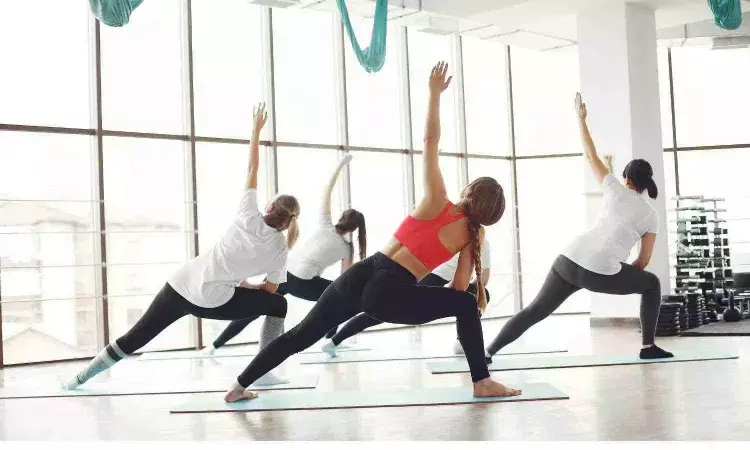- Home
- Medical news & Guidelines
- Anesthesiology
- Cardiology and CTVS
- Critical Care
- Dentistry
- Dermatology
- Diabetes and Endocrinology
- ENT
- Gastroenterology
- Medicine
- Nephrology
- Neurology
- Obstretics-Gynaecology
- Oncology
- Ophthalmology
- Orthopaedics
- Pediatrics-Neonatology
- Psychiatry
- Pulmonology
- Radiology
- Surgery
- Urology
- Laboratory Medicine
- Diet
- Nursing
- Paramedical
- Physiotherapy
- Health news
- Fact Check
- Bone Health Fact Check
- Brain Health Fact Check
- Cancer Related Fact Check
- Child Care Fact Check
- Dental and oral health fact check
- Diabetes and metabolic health fact check
- Diet and Nutrition Fact Check
- Eye and ENT Care Fact Check
- Fitness fact check
- Gut health fact check
- Heart health fact check
- Kidney health fact check
- Medical education fact check
- Men's health fact check
- Respiratory fact check
- Skin and hair care fact check
- Vaccine and Immunization fact check
- Women's health fact check
- AYUSH
- State News
- Andaman and Nicobar Islands
- Andhra Pradesh
- Arunachal Pradesh
- Assam
- Bihar
- Chandigarh
- Chattisgarh
- Dadra and Nagar Haveli
- Daman and Diu
- Delhi
- Goa
- Gujarat
- Haryana
- Himachal Pradesh
- Jammu & Kashmir
- Jharkhand
- Karnataka
- Kerala
- Ladakh
- Lakshadweep
- Madhya Pradesh
- Maharashtra
- Manipur
- Meghalaya
- Mizoram
- Nagaland
- Odisha
- Puducherry
- Punjab
- Rajasthan
- Sikkim
- Tamil Nadu
- Telangana
- Tripura
- Uttar Pradesh
- Uttrakhand
- West Bengal
- Medical Education
- Industry
Intense exercise may suppress appetite in healthy humans, finds study

A vigorous workout does more to suppress hunger levels in healthy adults than does moderate exercise, and females may be especially susceptible to this response, according to a small study published in the Journal of the Endocrine Society.
The study examines the effects of exercise intensity on ghrelin levels and appetite between men and women. Ghrelin is known as the “hunger hormone” and is associated with perceptions of hunger.
“We found that high intensity exercise suppressed ghrelin levels more than moderate intensity exercise,” said lead author Kara Anderson, Ph.D., of the University of Virginia and the University of Virginia Health System in Charlottesville, Va. “In addition, we found that individuals felt ‘less hungry’ after high intensity exercise compared to moderate intensity exercise.”
Ghrelin circulates in acylated (AG) and deacylated (DAG) forms, which are known to affect appetite. Data on the impact of exercise intensity on AG and DAG levels, and their effects on appetite, is sparse and primarily limited to males, the study noted.
To address this shortfall, the study examined eight males and six females. Participants fasted overnight and then completed exercises of varying intensity levels, determined by measurements of blood lactate, followed by self-reported measurements of appetite.
Females had higher levels of total ghrelin at baseline compared with males, the study noted. But only females demonstrated “significantly reduced AG” following the intense exercise, according to the findings.
“We found that moderate intensity either did not change ghrelin levels or led to a net increase,” the study noted. These findings suggest that exercise above the lactate threshold “may be necessary to elicit a suppression in ghrelin.”
Researchers also acknowledged that more work is needed to determine the extent to which the effects of exercise differ by sex.
Ghrelin has been shown to have wide-ranging biological effects in areas including energy balance, appetite, glucose homeostasis, immune function, sleep, and memory.
“Exercise should be thought of as a ‘drug,’ where the ‘dose’ should be customized based on an individual’s personal goals,” Anderson said. “Our research suggests that high-intensity exercise may be important for appetite suppression, which can be particularly useful as part of a weight loss program.”
Reference:
Kara C Anderson et al, The Impact of Exercise Intensity and Sex on Endogenous Ghrelin Levels and Appetite in Healthy Humans, Journal of the Endocrine Society (2024). DOI: 10.1210/jendso/bvae165
Dr Kamal Kant Kohli-MBBS, DTCD- a chest specialist with more than 30 years of practice and a flair for writing clinical articles, Dr Kamal Kant Kohli joined Medical Dialogues as a Chief Editor of Medical News. Besides writing articles, as an editor, he proofreads and verifies all the medical content published on Medical Dialogues including those coming from journals, studies,medical conferences,guidelines etc. Email: drkohli@medicaldialogues.in. Contact no. 011-43720751


